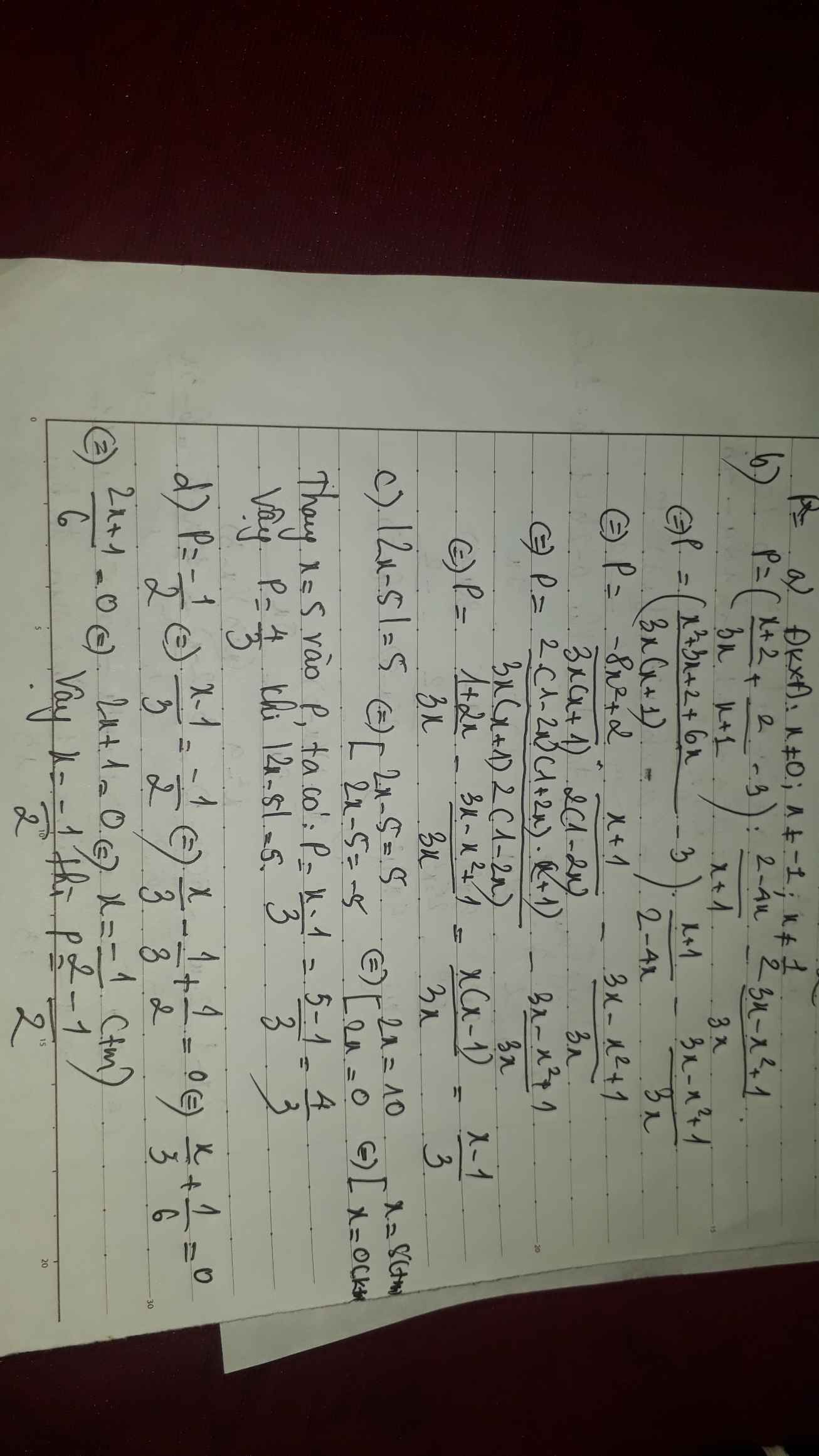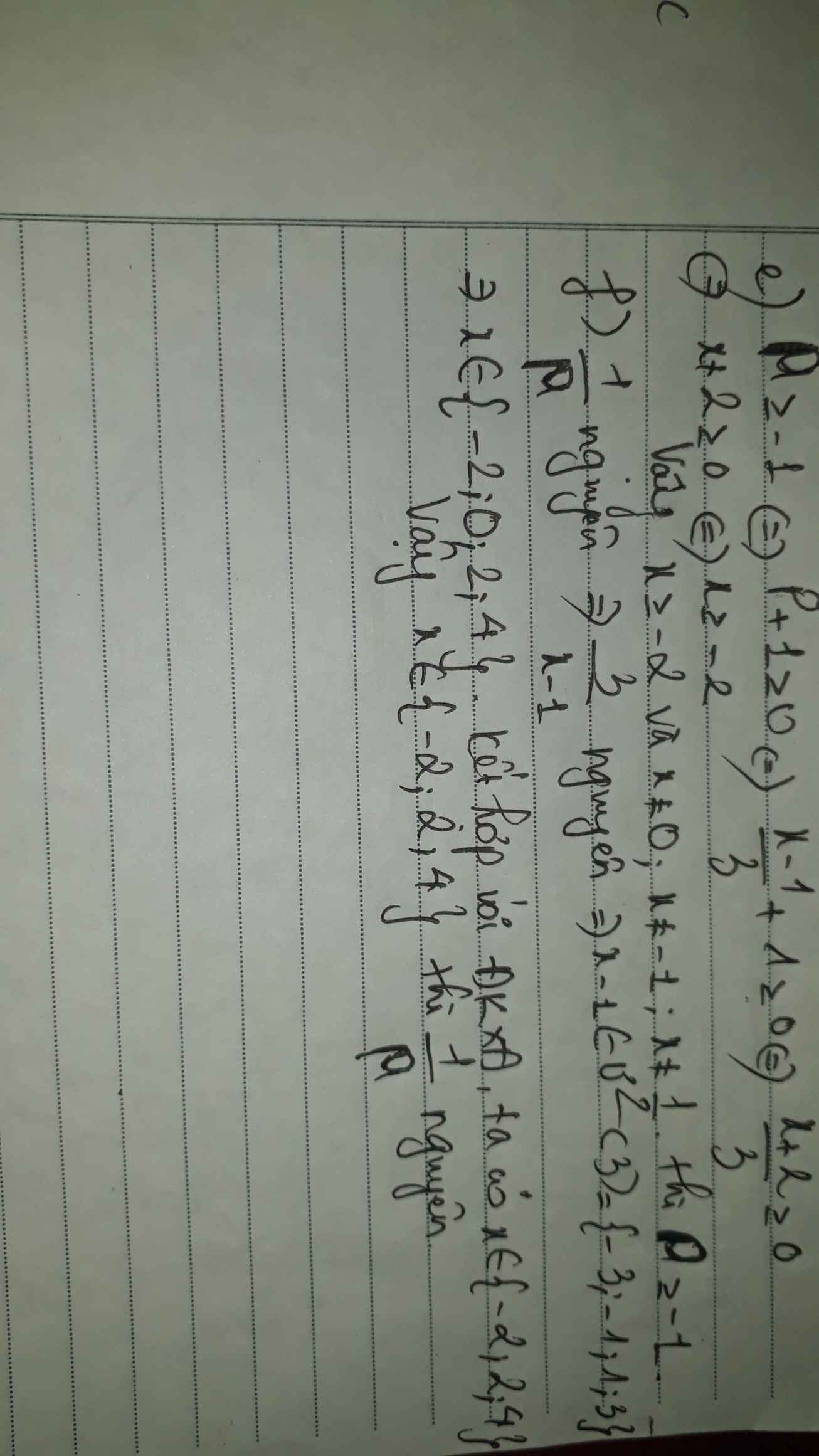Hãy nhập câu hỏi của bạn vào đây, nếu là tài khoản VIP, bạn sẽ được ưu tiên trả lời.

a: |x-1|=3
=>x-1=3 hoặc x-1=-3
=>x=-2(nhận) hoặc x=4(loại)
Khi x=-2 thì \(A=\dfrac{4+4}{-2-4}=\dfrac{8}{-6}=\dfrac{-4}{3}\)
b: ĐKXĐ: x<>4; x<>-4
\(B=\dfrac{-\left(x+4\right)}{x-4}+\dfrac{x-4}{x+4}-\dfrac{4x^2}{\left(x-4\right)\left(x+4\right)}\)
\(=\dfrac{-x^2-8x-16+x^2-8x+16-4x^2}{\left(x-4\right)\left(x+4\right)}=\dfrac{-4x^2-16x}{\left(x-4\right)\left(x+4\right)}\)
=-4x/x-4
c: A+B
=-4x/x-4+x^2+4/x-4
=(x-2)^2/(x-4)
A+B>0
=>x-4>0
=>x>4

a) ĐKXĐ: \(x\notin\left\{1;-1\right\}\)
b) Ta có: \(B=\left(\dfrac{2x+1}{x-1}+\dfrac{8}{x^2-1}-\dfrac{x-1}{x+1}\right)\cdot\dfrac{x^2-1}{5}\)
\(=\left(\dfrac{\left(2x+1\right)\left(x+1\right)}{\left(x-1\right)\left(x+1\right)}+\dfrac{8}{\left(x-1\right)\left(x+1\right)}-\dfrac{\left(x-1\right)^2}{\left(x+1\right)\left(x-1\right)}\right)\cdot\dfrac{\left(x-1\right)\left(x+1\right)}{5}\)
\(=\dfrac{2x^2+2x+x+1+8-\left(x^2-2x+1\right)}{\left(x-1\right)\left(x+1\right)}\cdot\dfrac{\left(x-1\right)\left(x+1\right)}{5}\)
\(=\dfrac{2x^2+3x+9-x^2+2x-1}{5}\)
\(=\dfrac{x^2+5x+8}{5}\)
Ta có: \(x^2+5x+8\)
\(=x^2+2\cdot x\cdot\dfrac{5}{2}+\dfrac{25}{4}+\dfrac{7}{4}\)
\(=\left(x+\dfrac{5}{2}\right)^2+\dfrac{7}{4}\)
Ta có: \(\left(x+\dfrac{5}{2}\right)^2\ge0\forall x\)
\(\Leftrightarrow\left(x+\dfrac{5}{2}\right)^2+\dfrac{7}{4}\ge\dfrac{7}{4}>0\forall x\)
\(\Leftrightarrow x^2+5x+8>0\forall x\)
\(\Leftrightarrow\dfrac{x^2+5x+8}{5}>0\forall x\) thỏa mãn ĐKXĐ(đpcm)

a) ĐKXĐ: \(x\ne-10;x\ne0;x\ne-5\)
b) \(P=\dfrac{x^2+2x}{2x+20}+\dfrac{x-5}{x}+\dfrac{50-5x}{2x\left(x+5\right)}\)
\(=\dfrac{x^2+2x}{2\left(x+10\right)}+\dfrac{x-5}{x}+\dfrac{50-5x}{2x\left(x+5\right)}\)
\(=\dfrac{x\left(x^2+2x\right)\left(x+5\right)}{2x\left(x+10\right)\left(x+5\right)}+\dfrac{2\left(x-5\right)\left(x+10\right)}{2x\left(x+10\right)\left(x+5\right)}+\dfrac{\left(50-5x\right)\left(x+10\right)}{2x\left(x+5\right)\left(x+10\right)}\)
\(=\dfrac{x^4+7x^3+10x^2+2x^2+10x-100+500-5x^2}{2x\left(x+10\right)\left(x+5\right)}\)
\(=\dfrac{x^4+7x^3+7x^2+10x+400}{2x\left(x+10\right)\left(x+5\right)}\)
c) \(P=0\Rightarrow x^4+7x^3+7x^2+10x+400=0\Leftrightarrow...\)
Số xấu thì câu c, d làm cũng như không. Bạn xem lại đề.

Bài 1: ĐKXĐ:`x + 3 ne 0` và `x^2+ x-6 ne 0 ; 2-x ne 0`
`<=> x ne -3 ; (x-2)(x+3) ne 0 ; x ne2`
`<=>x ne -3 ; x ne 2`
b) Với `x ne - 3 ; x ne 2` ta có:
`P= (x+2)/(x+3) - 5/(x^2 +x -6) + 1/(2-x)`
`P = (x+2)/(x+3) - 5/[(x-2)(x+3)] + 1/(2-x)`
`= [(x+2)(x-2)]/[(x-2)(x+3)] - 5/[(x-2)(x+3)] - (x+3)/[(x-2)(x+3)]`
`= (x^2 -4)/[(x-2)(x+3)] - 5/[(x-2)(x+3)] - (x+3)/[(x-2)(x+3)]`
`=(x^2 - 4 - 5 - x-3)/[(x-2)(x+3)]`
`= (x^2 - x-12)/[(x-2)(x+3)]`
`= [(x-4)(x+3)]/[(x-2)(x+3)]`
`= (x-4)/(x-2)`
Vậy `P= (x-4)/(x-2)` với `x ne -3 ; x ne 2`
c) Để `P = -3/4`
`=> (x-4)/(x-2) = -3/4`
`=> 4(x-4) = -3(x-2)`
`<=>4x -16 = -3x + 6`
`<=> 4x + 3x = 6 + 16`
`<=> 7x = 22`
`<=> x= 22/7` (thỏa mãn ĐKXĐ)
Vậy `x = 22/7` thì `P = -3/4`
d) Ta có: `P= (x-4)/(x-2)`
`P= (x-2-2)/(x-2)`
`P= 1 - 2/(x-2)`
Để P nguyên thì `2/(x-2)` nguyên
`=> 2 vdots x-2`
`=> x -2 in Ư(2) ={ 1 ;2 ;-1;-2}`
+) Với `x -2 =1 => x= 3` (thỏa mãn ĐKXĐ)
+) Với `x -2 =2 => x= 4` (thỏa mãn ĐKXĐ)
+) Với `x -2 = -1=> x= 1` (thỏa mãn ĐKXĐ)
+) Với `x -2 = -2 => x= 0`(thỏa mãn ĐKXĐ)
Vậy `x in{ 3 ;4; 1; 0}` thì `P` nguyên
e) Từ `x^2 -9 =0`
`<=> (x-3)(x+3)=0`
`<=> x= 3` hoặc `x= -3`
+) Với `x=3` (thỏa mãn ĐKXĐ) thì:
`P = (3-4)/(3-2)`
`P= -1/1`
`P=-1`
+) Với `x= -3` thì không thỏa mãn ĐKXĐ
Vậy với x= 3 thì `P= -1`

a: ĐKXĐ: x<>0; x<>-3
b: \(=\dfrac{x^2+6x+9}{x\left(x+3\right)}\cdot\dfrac{2}{x+3}=\dfrac{2}{x}\)
c: Khi x=1/5 thì A=2:1/5=10

Bài 1:
\(a,ĐK:x\ne\pm5\\ b,P=\dfrac{x-5+2x+10-2x-10}{\left(x-5\right)\left(x+5\right)}=\dfrac{x-5}{\left(x-5\right)\left(x+5\right)}=\dfrac{1}{x+5}\\ c,P=-3\Leftrightarrow x+5=-\dfrac{1}{3}\Leftrightarrow x=-\dfrac{16}{3}\\ d,P\in Z\Leftrightarrow x+5\inƯ\left(1\right)=\left\{-1;1\right\}\\ \Leftrightarrow x\in\left\{-6;-4\right\}\)
Bài 2:
\(a,\Leftrightarrow\dfrac{3\left(x^2+2x+4\right)}{\left(x-2\right)\left(x^2+2x+4\right)}=\dfrac{3}{x-2}=0\Leftrightarrow x\in\varnothing\\ b,\Leftrightarrow\dfrac{x\left(2-x\right)}{\left(x-2\right)\left(x+2\right)}=0\Leftrightarrow\dfrac{-x}{x+2}=0\Leftrightarrow x=0\)

a. \(A=\left(\dfrac{2-3x}{x^2+2x-3}-\dfrac{x+3}{1-x}-\dfrac{x+1}{x+3}\right):\dfrac{3x+12}{x^3-1}\left(ĐKXĐ:x\ne1;x\ne-3\right)\)
\(=\left(\dfrac{2-3x}{\left(x-1\right)\left(x+3\right)}+\dfrac{x+3}{x-1}-\dfrac{x+1}{x+3}\right):\dfrac{3x+12}{\left(x-1\right)\left(x^2+x+1\right)}\)
\(=\left(\dfrac{2-3x}{\left(x-1\right)\left(x+3\right)}+\dfrac{\left(x+3\right)^2}{\left(x-1\right)\left(x+3\right)}-\dfrac{\left(x-1\right)\left(x+1\right)}{\left(x-1\right)\left(x+3\right)}\right):\dfrac{3x+12}{\left(x-1\right)\left(x^2+x+1\right)}\)
\(=\dfrac{2-3x+x^2+6x+9-x^2+1}{\left(x-1\right)\left(x+3\right)}:\dfrac{3x+12}{\left(x-1\right)\left(x^2+x+1\right)}\)
\(=\dfrac{3x+12}{\left(x-1\right)\left(x+3\right)}:\dfrac{3x+12}{\left(x-1\right)\left(x^2+x+1\right)}\)
\(=\dfrac{3x+12}{\left(x-1\right)\left(x+3\right)}.\dfrac{\left(x-1\right)\left(x^2+x+1\right)}{3x+12}=\dfrac{x^2+x+1}{x+3}\)
\(M=A.B=\dfrac{x^2+x+1}{x+3}.\dfrac{x^2+x-2}{\left(x-1\right)\left(x^2+x+1\right)}=\dfrac{x^2+x-2}{x+3}\)
b. -Để M thuộc Z thì:
\(\left(x^2+x-2\right)⋮\left(x+3\right)\)
\(\Rightarrow\left(x^2+3x-2x-6+4\right)⋮\left(x+3\right)\)
\(\Rightarrow\left[x\left(x+3\right)-2\left(x+3\right)+4\right]⋮\left(x+3\right)\)
\(\Rightarrow4⋮\left(x+3\right)\)
\(\Rightarrow x+3\in\left\{1;2;4;-1;-2;-4\right\}\)
\(\Rightarrow x\in\left\{-2;-1;1;-4;-5;-7\right\}\)
c. \(A^{-1}-B=\dfrac{x+3}{x^2+x+1}-\dfrac{x^2+x-2}{x^3-1}\)
\(=\dfrac{x+3}{x^2+x+1}-\dfrac{x^2+x-2}{\left(x-1\right)\left(x^2+x+1\right)}\)
\(=\dfrac{\left(x+3\right)\left(x-1\right)}{\left(x-1\right)\left(x^2+x+1\right)}-\dfrac{x^2+x-2}{\left(x-1\right)\left(x^2+x+1\right)}\)
\(=\dfrac{x^2-x+3x-3-x^2-x+2}{\left(x-1\right)\left(x^2+x+1\right)}\)
\(=\dfrac{x-1}{\left(x-1\right)\left(x^2+x+1\right)}=\dfrac{1}{x^2+x+1}\)
\(=\dfrac{1}{x^2+2.\dfrac{1}{2}x+\dfrac{1}{4}+\dfrac{3}{4}}=\dfrac{1}{\left(x+\dfrac{1}{2}\right)^2+\dfrac{3}{4}}\le\dfrac{1}{\dfrac{3}{4}}=\dfrac{4}{3}\)
\(Max=\dfrac{4}{3}\Leftrightarrow x=\dfrac{-1}{2}\)


a) Để M xác định thì \(\left\{{}\begin{matrix}3x\ne0\\x+1\ne0\\2-4x\ne0\end{matrix}\right.\Leftrightarrow\left\{{}\begin{matrix}x\ne0\\x\ne-1\\x\ne\dfrac{1}{2}\end{matrix}\right.\)
Khi đó: \(M=\left(\dfrac{x+2}{3x}+\dfrac{2}{x+1}-3\right):\dfrac{2-4x}{x+1}-\dfrac{3x-x^2+1}{3x}\)
\(M=\left[\dfrac{\left(x+2\right)\left(x+1\right)}{3x\left(x+1\right)}+\dfrac{2\cdot3x}{3x\left(x+1\right)}-\dfrac{3\cdot3x\left(x+1\right)}{3x\left(x+1\right)}\right]\cdot\dfrac{x+1}{2-4x}+\dfrac{x^2-3x-1}{3x}\)
\(M=\dfrac{x^2+3x+2+6x-9x^2-9x}{3x\left(x+1\right)}\cdot\dfrac{x+1}{2-4x}+\dfrac{x^2-3x-1}{3x}\)
\(M=\dfrac{-8x^2+2}{3x}\cdot\dfrac{1}{2\left(1-2x\right)}+\dfrac{x^2-3x-1}{3x}\)
\(M=\dfrac{-2\left(4x^2-1\right)}{3x\cdot2\left(1-2x\right)}+\dfrac{x^2-3x-1}{3x}\)
\(M=\dfrac{-\left(2x-1\right)\left(2x+1\right)}{-3x\cdot\left(2x-1\right)}+\dfrac{x^2-3x-1}{3x}\)
\(M=\dfrac{2x+1}{3x}+\dfrac{x^2-3x-1}{3x}\)
\(M=\dfrac{x^2-x}{3x}\)
\(M=\dfrac{x\left(x-1\right)}{3x}\)
\(M=\dfrac{x-1}{3}\)
Vậy \(M=\dfrac{x-1}{3}\) với \(x\ne0;x\ne-1;x\ne\dfrac{1}{2}\).
b) Để \(M=2006\) thì \(\dfrac{x-1}{3}=2006\)
\(\Leftrightarrow x-1=6018\)
\(\Leftrightarrow x=6019\left(tmdk\right)\)
Vậy \(M=2006\) khi \(x=6019\).